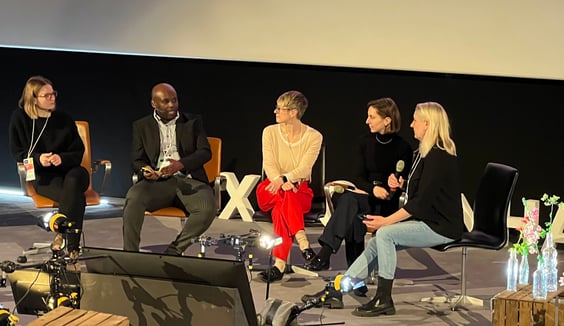UX and Design
FLoC: Can Google build a cookieless future?
20 September 2021 • 4 min read
.png?width=1920&height=836&name=FLoC-%20Can%20Google%20build%20a%20cookieless%20future_%20(1).png)
If, as we saw recently, the world of cookie preferences is fragmented and confusing, Google seems to think it has a solution: FLoC. However, news of its delay to 2022 (maybe even 2023) - which came in June - highlights that implementing this new approach won’t be easy. The delay has been caused by criticism from diverse parts of the industry from antitrust advocates to the advertising sector.
But what is FLoC? And why exactly is it problematic? And how could Google find a way forward and make it work for everyone?
What is FLoC?
FLoC stands for Federated Learning of Cohorts. Essentially, it is a move to introduce anonymisation and privacy protection into its advertising model. It is intended to bring about a “cookieless future.”
It offers an alternative to the third party cookie model. Whereas third party cookies track individual users - ie. you - with FLoC in place, individuals will no longer be tracked as individuals, and instead be tracked as a group with related interests. To follow the acronym, this is a cohort.
Why is Google trying to make FLoC happen?
There are a number of different reasons why Google is trying to make FLoC happen. On the one hand, it is a way of making digital advertising (the core of Google’s business model) sustainable. If the number of users opting into cookie tracking are decreasing (as a result of legislation like GDPR), this means the very foundations of digital advertising will likely collapse. Yes, that might be bad news for businesses that use digital marketing to power growth, but it’s an even bigger problem for Google, as it is the main broker right at the centre of this advertising ecosystem.
FLoC and Google Analytics 4
It’s difficult to properly understand FLoC without viewing it in the context of Google Analytics 4. This is an evolution from the current Google Analytics platform that is entirely dependent on a user opting in to analytics cookies. We will see user volumes in digital analytics platforms shrink over the coming months and years as users continue to reject opt-ins. This will undermine the accuracy of the digital insights that analytics professionals collate and use.
GA4 is another tool that Google is suggesting will be using machine learning to plug these gaps, and ultimately provide a clearer view on how the majority of your customers are actually using your website.
FLoC, then, is Google’s attempt to retain the overall principles behind digital advertising. By anonymising individual user data, it can be presented as something that tackles the very privacy issues that third party cookies create. Through a combination of machine learning, historic anonymised data and customer input, FLoC looks to effectively deliver similar levels of advertising accuracy (retaining the advertising spend model) whilst respecting a user’s right to not be tracked.
What are the criticisms of FLoC?
There are a number of criticisms of FLoC. However, these mainly centre around two key questions:
- Can FLoC actually anonymise data while also delivering accurate results? (In other words, how simple is it for Google to actually create an audience of 1 person?)
- Does this just move the focus from an on-site cookie to the data a user provides Google via the use of a chrome browser?
This second point raises important questions about antitrust. Doesn’t FLoC just move ownership of cookies from websites to the browser? Tech activist Cory Doctorow recently suggested that Google is "appointing itself the gatekeeper who decides when we’re spied on while skimming from advertisers with nowhere else to go."
There are also question marks around the extent to which FLoC actually complies with GDPR. If that piece of legislation gives citizens the right to understand how their data is used by first and third parties, what happens when those citizens become part of a supposedly anonymous cohort? While that data is supposedly anonymous, it still relates to real people.
This is something Johannes Caspar, Head of Hamburg’s data protection agency has argued. He said that FLoC "could be seen as an act of processing personal data" which requires "freely given consent and clear and transparent information about these operations."
What next for FLoC?
So - what’s next? FLoC might be on hold, but it’s still evolving as this interview with Josh Karlin, a tech lead manager of Google’s Privacy Sandbox team from July 2021 suggests; approaches to testing this were shared very recently (August 2021), with monthly updates promised. This ongoing reflection and refinement will hopefully give Google some time to make sure that their process can be:
- Easily adopted.
- As transparent as possible.
- As globally compliant as possible.
- As insulated as possible from broader criticism.
- And as we saw with the fractured nature of current cookie management, hopefully a little more consistent!
But it also gives businesses an opportunity to fully gear up for the coming changes. You can:
- Make sure your cookie policies are fully compliant.
- Ensure that you have as strong a preference and customer data management capability as possible.
- Consider your users and how you’re making sure that you can get as large an opt in volume as possible to optimise the data you can work with.
- Fully assess the impact reduced cookie opt-ins on your current tech stack.
- Reach out to your third party partners to make sure that they are considering all possible impacts of any future third party cookie removal.
A really effective way of addressing these (and many other data and insight opportunities) is with a unified Data Strategy. With the development of a comprehensive data strategy, you can ensure that you are collaborating and engaging with your teams as effectively and efficiently as possible; doing so guarantees that the platforms for data collection, the processes and its use are as robust and impactful as possible.
Talk to AND Digital about better managing and leveraging data. Get in touch.



